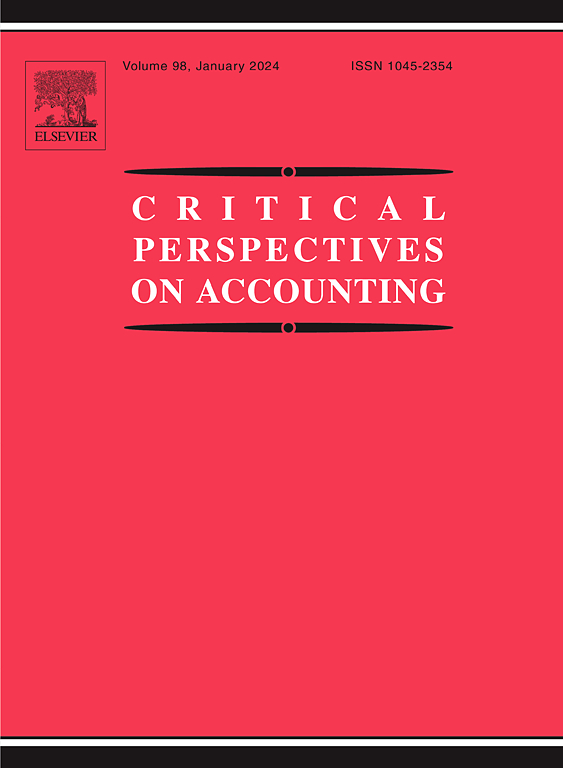Political scandals, media bias and the moral ambiguity of fraud and corruption
IF 5.7
2区 管理学
Q1 BUSINESS, FINANCE
引用次数: 0
Abstract
Although there is wide acknowledgement that the media play a significant role in the construction of scandals involving fraud and corruption, surprisingly little attention has been paid to the issue of morality. As scandals are prima facie dependent upon wrongdoing, an adequate understanding of their construction requires examining whether and how they are framed in moral terms. This paper explores the potential moral framing of wrongdoing in the context of an ongoing political scandal involving two mayors at a local government municipality, through both initial media allegations and subsequent trial proceedings. Drawing on key perspectives from ethics and moral philosophy, we examine how prominent media newspapers frame wrongdoing in terms of adverse outcomes (utilitarian), a violation of duties (deontological), and character (virtue ethics). Our investigation extends the literature by showing how the moral and ethical dimensions of fraud and corruption are either emphasised or silenced due to intentional and unintentional media bias, and highlight the frequent conflation between legal and ethical wrongdoing in media narratives. Our analysis also shows how media often frame fraud and corruption in terms of a breach of legality yet frequently fails to articulate why this behaviour is non-compliant with moral or ethical norms, despite evidence that these moral dimensions are present. Finally, we highlight a difference between ethics and governance, demonstrating how employee behaviour may contravene principles of good governance without necessarily breaching ethical standards or the law.
政治丑闻、媒体偏见以及欺诈和腐败的道德模糊性
尽管人们普遍承认媒体在制造涉及欺诈和腐败的丑闻中起着重要作用,但令人惊讶的是,人们很少关注道德问题。由于丑闻表面上依赖于不法行为,要充分理解它们的结构,就需要研究它们是否以及如何以道德的方式被框定。本文通过最初的媒体指控和随后的审判程序,探讨了在涉及当地政府市政当局两名市长的持续政治丑闻的背景下,不法行为的潜在道德框架。借鉴伦理学和道德哲学的关键观点,我们研究了著名媒体报纸如何在不利结果(功利主义)、违反义务(道义论)和品格(美德伦理)方面构建不法行为。我们的调查扩展了文献,展示了欺诈和腐败的道德和伦理层面如何由于有意和无意的媒体偏见而被强调或沉默,并强调了媒体叙事中法律和道德不法行为之间的频繁混淆。我们的分析还显示,媒体如何经常以违反法律的方式来框定欺诈和腐败,但往往未能阐明为什么这种行为不符合道德或伦理规范,尽管有证据表明这些道德层面是存在的。最后,我们强调道德和治理之间的区别,展示员工的行为如何违背良好治理的原则,而不一定违反道德标准或法律。
本文章由计算机程序翻译,如有差异,请以英文原文为准。
求助全文
约1分钟内获得全文
求助全文
来源期刊

Critical Perspectives on Accounting
BUSINESS, FINANCE-
CiteScore
9.40
自引率
7.80%
发文量
91
期刊介绍:
Critical Perspectives on Accounting aims to provide a forum for the growing number of accounting researchers and practitioners who realize that conventional theory and practice is ill-suited to the challenges of the modern environment, and that accounting practices and corporate behavior are inextricably connected with many allocative, distributive, social, and ecological problems of our era. From such concerns, a new literature is emerging that seeks to reformulate corporate, social, and political activity, and the theoretical and practical means by which we apprehend and affect that activity. Research Areas Include: • Studies involving the political economy of accounting, critical accounting, radical accounting, and accounting''s implication in the exercise of power • Financial accounting''s role in the processes of international capital formation, including its impact on stock market stability and international banking activities • Management accounting''s role in organizing the labor process • The relationship between accounting and the state in various social formations • Studies of accounting''s historical role, as a means of "remembering" the subject''s social and conflictual character • The role of accounting in establishing "real" democracy at work and other domains of life • Accounting''s adjudicative function in international exchanges, such as that of the Third World debt • Antagonisms between the social and private character of accounting, such as conflicts of interest in the audit process • The identification of new constituencies for radical and critical accounting information • Accounting''s involvement in gender and class conflicts in the workplace • The interplay between accounting, social conflict, industrialization, bureaucracy, and technocracy • Reappraisals of the role of accounting as a science and technology • Critical reviews of "useful" scientific knowledge about organizations
 求助内容:
求助内容: 应助结果提醒方式:
应助结果提醒方式:


